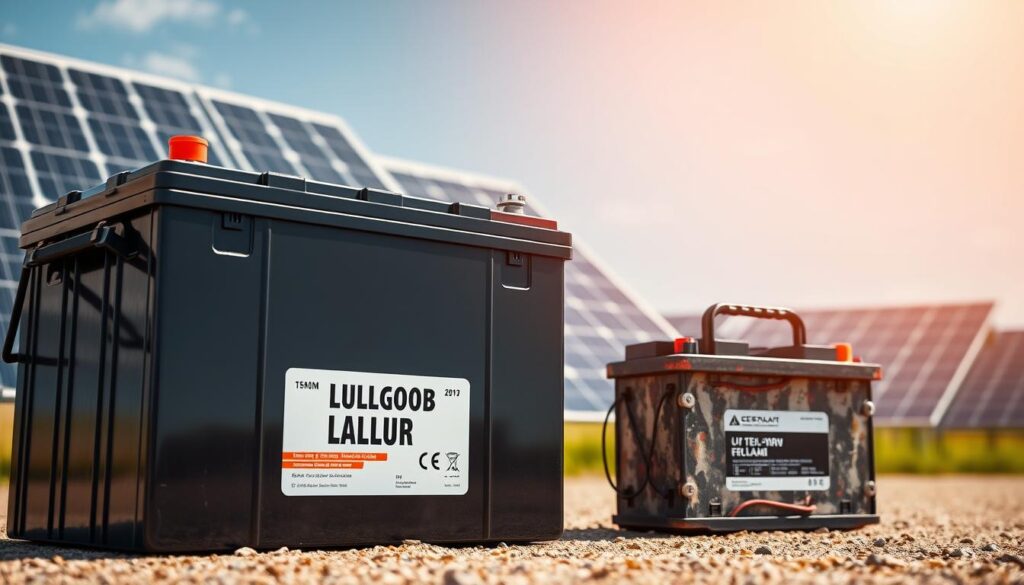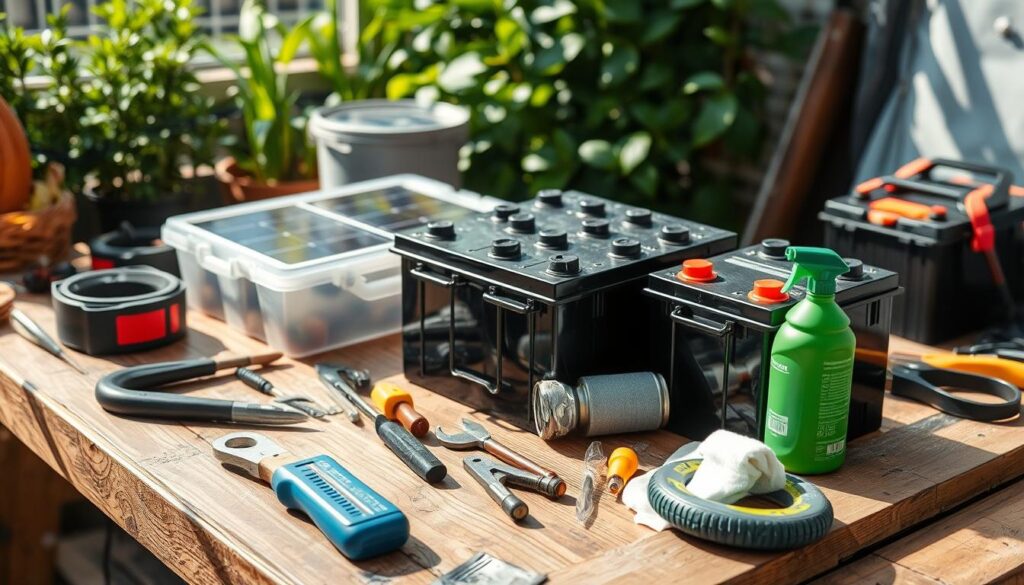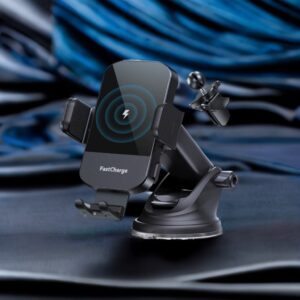
Solar panel batteries are key for off-grid living. They provide energy when the sun is down. They store extra energy from the day for use at night or during outages.
This tech is vital for cutting down on fossil fuel use and lowering carbon emissions. It’s perfect for those wanting to live off the grid but enjoy modern comforts.
Using solar batteries can cut down on energy costs and ensure constant power. They work well with solar panels, storing extra energy for later. This setup boosts energy independence and cuts down on grid reliance.
With the right solar panel batteries, you can enjoy clean energy and lessen your environmental impact.
Solar batteries are vital for off-grid energy systems. They provide power when the sun isn’t out. Investing in efficient solar panel batteries ensures a steady energy supply and lowers carbon footprint.
As we move towards renewable energy, solar panel batteries will become even more important. They offer clean, sustainable power.
Introduction to Solar Panel Batteries
Solar panel batteries are a must for solar energy systems. They let homeowners store extra energy for later use. With the right solar batteries, you can boost energy independence and cut down on grid reliance.
In this guide, we’ll dive into solar panel batteries. We’ll cover the basics, types, and best practices for solar batteries.
Key Takeaways
- Efficient solar panel batteries are key for off-grid living
- Solar batteries store extra energy from solar panels during the day
- Solar panel batteries ensure constant power during outages or at night
- Using solar batteries can greatly reduce energy costs
- Solar panel batteries work well with solar panels
- Investing in efficient solar panel batteries can lessen environmental impact
Understanding Solar Panel Batteries: Core Concepts
Solar energy storage systems are key for those wanting to use the sun’s power. At the center of these systems are solar panel batteries. They store extra energy made by solar panels. Solar energy storage is essential for any solar power system, letting users save energy for later. Rechargeable solar batteries are a main part of this, making energy storage reliable and efficient.
To grasp how solar batteries work, it’s important to know about rechargeable solar batteries. These batteries save extra energy made by solar panels during the day. This way, users can power their homes and businesses at night or when it’s cloudy. Learning about solar energy storage and rechargeable solar batteries helps people make smart choices for their solar systems.
Key Components of Solar Energy Storage Systems
- Solar panels: Generate energy from sunlight
- Charge controllers: Regulate the flow of energy to the battery
- Rechargeable solar batteries: Store excess energy for later use
- Inverters: Convert stored energy into usable power
Benefits of Rechargeable Solar Batteries
Rechargeable solar batteries have many advantages. They help lower energy costs, increase energy independence, and reduce carbon emissions. By choosing a solar energy storage system with rechargeable solar batteries, people can move towards a greener future.
Types of Solar Panel Batteries Available Today

Choosing the right batteries for solar panels is key. Solar power storage is vital for any solar system. You have options like lead-acid, lithium-ion, and nickel-cadmium batteries.
Each battery type has its own strengths. Lead-acid batteries are cheap but less efficient. Lithium-ion batteries are efficient and last long but cost more. Here’s a quick look at each:
- Lead-acid batteries: low cost, relatively low efficiency
- Lithium-ion batteries: high efficiency, long lifespan, high cost
- Nickel-cadmium batteries: high discharge rate, toxic materials
When picking batteries, think about capacity, how deep you can discharge them, and warranty. Solar power storage systems can be tailored to your energy needs. The right battery ensures a steady and efficient energy supply.
Essential Components of Solar Battery Systems

Solar battery backup solutions have several key parts. At the center are lithium solar batteries. They store extra energy from solar panels. Charge controllers manage and regulate energy flow.
A charge controller is key. It controls how much energy goes from solar panels to batteries. This stops overcharging, which can harm batteries and shorten their life. Inverters are also important. They turn DC power from batteries to AC power for home use.
Key Components of Solar Battery Systems
- Charge controllers: regulate energy flow from solar panels to batteries
- Inverters: convert DC power to AC power for household use
- Battery management systems (BMS): monitor and manage battery performance
Knowing the parts of solar battery systems helps in making smart choices. This includes lithium solar batteries and their role in backup solutions. A well-designed system offers reliable, green energy. It cuts down on grid use and energy costs.
Choosing the Right Solar Panel Batteries for Your Setup
Choosing solar panel batteries involves several key factors. You need to find a balance between capacity, climate, and budget. An off-grid solar battery system requires careful thought about these elements for the best performance and efficiency. Solar panel batteries store extra energy from your solar panels for later use.
First, figure out how much energy you need each day. Then, pick a battery system that can handle that amount. Also, think about the climate where you live. Extreme temperatures can harm your solar panel batteries. It’s essential to evaluate the durability and weather resistance of your solar panel batteries to ensure they can withstand the elements.
Key Factors to Consider
- Capacity requirements: Calculate your daily energy needs to determine the required battery capacity.
- Climate considerations: Assess the durability and weather resistance of your solar panel batteries.
- Budget and long-term value: Evaluate the cost of different solar panel batteries and their long-term savings.
By considering these factors and choosing the right solar panel batteries, you can have a reliable and efficient off-grid solar battery system.
| Battery Type | Capacity | Lifespan |
|---|---|---|
| Lead-Acid | 200-400 Ah | 5-7 years |
| Lithium-Ion | 100-300 Ah | 10-15 years |
Lithium vs. Lead-Acid: A Comparative Look

Choosing the right battery for solar energy storage is key. Lithium and lead-acid batteries are two top picks. Lithium batteries are efficient and last long, ideal for solar batteries. Lead-acid batteries are cheaper and easy to find.
Lithium batteries can handle deeper discharges, perfect for solar energy storage needs. They can be used more before needing a recharge. Lead-acid batteries, with a lower discharge depth, are better for steady power needs.
Here are some key points to consider when comparing lithium and lead-acid batteries for solar batteries:
- Higher efficiency: Lithium batteries lose less energy during use.
- Longer lifespan: Lithium batteries can last up to 10 years, while lead-acid batteries last 5-7 years.
- Lighter weight: Lithium batteries are lighter and more compact.
- Lower maintenance: Lithium batteries need less upkeep, as they don’t require water refills.
In conclusion, lithium batteries are better for solar energy storage due to their efficiency, long life, and low upkeep. While lead-acid batteries are cheaper, their lower discharge depth and shorter life make them less ideal for high power systems.
Installation and Maintenance Best Practices

Proper installation and maintenance are key for rechargeable solar batteries and solar panels. A well-installed system is safe and efficient. It makes the most of your solar energy investment.
To ensure this, follow specific guidelines and recommendations. Here are some important points:
Safety Guidelines
- Always wear protective gear when handling batteries or electrical components.
- Ensure the system is grounded correctly to prevent electrical shocks.
- Follow the manufacturer’s instructions for installation and maintenance.
Monitoring System Performance
Regularly check your solar panel battery system’s performance. Look at charge levels, voltage, and overall health. This helps spot issues early and extend your batteries’ life.
Regular Maintenance Schedule
Keeping up a regular maintenance schedule is vital. This includes cleaning panels, checking battery terminals, and ensuring connections are secure. Regular maintenance prevents corrosion and keeps your system efficient.
Maximizing Battery Life and Efficiency

To get the most out of your solar power storage system, it’s key to maximize battery life and efficiency. Follow simple tips and strategies for this. Proper maintenance and care can greatly extend your solar battery backup system’s lifespan.
Some key considerations for maximizing battery life and efficiency include:
- Optimal charging and discharging practices
- Temperature management to prevent overheating
- Avoiding deep discharges, which can reduce battery lifespan
By following these guidelines and taking a proactive approach to battery maintenance, you can ensure your solar power storage system operates at peak efficiency. It will provide reliable
Regular monitoring and maintenance can also help identify issues before they become major problems. This allows you to take corrective action and prevent damage to your system. By investing time and effort into maximizing battery life and efficiency, you can enjoy a reliable and sustainable source of energy for years to come.
| Tip | Description |
|---|---|
| Monitor battery state of charge | Regularly check the state of charge to avoid deep discharges |
| Maintain a consistent charging schedule | Charge your batteries at the same time every day to optimize performance |
Common Challenges and Troubleshooting Solutions
Using lithium solar batteries and off-grid solar systems can come with challenges. These can affect how well they work. It’s key to find the cause and fix the problem.
Some common issues include batteries not working as well as they should. This might be due to how much they’re used, how often they’re charged, or the environment. Problems can also happen when trying to connect different parts of the system.
Battery Performance Issues
To solve these problems, there are a few things you can do. Keep an eye on how charged your batteries are and try not to use them too much. Make sure they’re charged and maintained correctly. Regular checks and tests can spot issues early.
System Integration Problems
System problems can also be fixed. Choose parts that work well together and follow the instructions. If you need help, don’t hesitate to ask a professional. This way, you can make sure your system runs smoothly and efficiently.
Knowing about common problems with lithium solar batteries and systems helps a lot. You can prevent issues by picking good quality parts and following best practices. Stay updated with new solar technology to keep your system running well.
Cost Analysis and Return on Investment
Thinking about solar panel batteries? It’s key to look at the cost and what you’ll save in the long run. The upfront cost is high, but the savings are worth it. Solar batteries store extra energy for when the sun isn’t shining.
The price of solar batteries changes based on their type, quality, and brand. But, as prices drop and efficiency goes up, the benefits are clear. Many are finding that the money saved on bills is more than the cost of the batteries.
Initial Investment Considerations
When looking at the cost of solar batteries, think about the battery price, installation, and extra gear needed. Don’t forget about ongoing costs like maintenance and replacement. These add up over time.
Long-term Savings
Solar batteries offer big savings over time. They cut down on grid use and bills. Plus, they provide power when the grid is down, saving money on generators.
Available Incentives and Rebates
Many places offer help to get solar batteries. This can lower the upfront cost. Look for tax credits, rebates, and loans with low interest.
In the US, there’s a tax credit for up to 26% of the system cost. States and utilities also offer rebates and other perks.
| Incentive | Description |
|---|---|
| Tax Credit | Up to 26% of total system cost |
| Rebates | Varying amounts, depending on state and utility |
| Low-Interest Loans | Available through some states and utilities |
By weighing the costs, savings, and incentives, you can decide if solar batteries are right for you. With the right mix, you can save money and use less grid power.
Conclusion: Powering Your Sustainable Future with Solar Battery Storage
Solar energy storage is key to a sustainable future. Rechargeable solar batteries offer reliable power off the grid. They also help us use renewable energy better.
By adding solar battery systems to our homes and businesses, we use less fossil fuels. This lowers our carbon footprint and helps make the world cleaner and greener.
The future of energy is solar, and battery tech is getting better fast. This means we can live off the grid and be energy independent. Investing in good solar panel batteries lets you save money and help the planet. It’s a step towards a better future for everyone.
FAQ
What are the key benefits of using solar panel batteries?
Solar panel batteries provide reliable power when you’re off the grid. They store extra energy for later use. This reduces your need for the grid, lowers energy costs, and supports a greener future.
What are the different types of solar panel batteries available?
There are mainly three types: lead-acid, lithium-ion, and saltwater batteries. Each has its own strengths and weaknesses. These include cost, efficiency, lifespan, and performance.
How do I size my solar battery system correctly?
When sizing your solar battery system, think about your energy use, solar array size, and the environment. It’s best to get help from a professional. They can make sure your system fits your needs perfectly.
What is the difference between lithium-ion and lead-acid batteries for solar applications?
Lithium-ion batteries offer more energy, last longer, and perform better than lead-acid batteries. But, lead-acid batteries are cheaper upfront. Your choice depends on your budget, energy needs, and system requirements.
How can I maximize the lifespan and efficiency of my solar panel batteries?
To extend your battery’s life and boost its efficiency, install it correctly and maintain it regularly. Avoid overcharging or deep discharging. Keep it at the right temperature. Following the manufacturer’s guidelines is key.
What are some common challenges with solar panel batteries and how can they be addressed?
Challenges include battery performance issues, integration problems, and weather effects. Proper design, maintenance, and troubleshooting can solve these. Working with experts can help find and fix problems.
How can I evaluate the cost-effectiveness of investing in solar panel batteries?
To check if solar batteries are worth it, look at the initial cost, long-term savings, and any incentives. Calculate the return on investment (ROI) over time. This will show the financial benefits of solar batteries for your energy setup.






